- Home
- Upton Sinclair
Dragon Harvest Page 22
Dragon Harvest Read online
Page 22
In his hand he held a strip of paper which apparently had come off a teletype. Without a word he put it into the Führer’s outstretched hand, and the great man took one glance. Then it was as if his chair had been wired with electricity and the current had been suddenly turned on. “Teufelsdreck!” he shouted, and bounced once and then a second bounce that brought him to his feet. There followed a stream of language which could not have been printed in any German book. It was interrupted by a single glance at the secretary and the word “’R-r-r-raus!” The man fled, even faster than he had entered, and Hitler took half a dozen steps across the room, cursing furiously, then turned and came toward his guest, holding out the scrap of paper: “Sehen Sie, Herr Budd—die gottverdammten Schurken!”
Lanny took the paper and read four words: “Hacha hat Tiso abgesetzt.” He didn’t have to ask any questions—indeed he couldn’t, for Hitler was off across the room again, raging and storming in that raucous voice which the whole civilized world had learned to know over the radio. It was one of his peculiarities over which Lanny never ceased to wonder, that he shouted just as loud for one person as for ten thousand, and was willing to take just as much trouble to scold or exhort or educate or inspire one person as a million. “You see, Herr Budd, what I have to endure! This wretched, presumptuous creature was represented to me as a tame Czech, a man who would cultivate friendship with Germany—a weakling, a sick man who could not do anything if he wished—but this man has been intriguing, lying to my agents, putting obstacles in my path for nearly half a year. He presumes to be dissatisfied with the government which Father Tiso has been giving to the province of Slovakia—and on no grounds except that this able priest is favorable to our National-Socialist point of view and will no longer permit his native land to be victimized by Jewish intrigues and his peasants to be robbed by Jewish moneylenders! So I read: ‘Hacha has deposed Tiso!’ A defiance of my will, of my precise instructions! So, you see how it is—they no longer believe that I mean what I say, they force me to teach them all over again. Gut, Sie sollen haben was Sie wollen!”
The Führer rushed to his desk and pressed a button; there was some sort of telephone apparatus apparently sunk into the desk, and it probably didn’t require a loud voice, but the Führer’s voice was always loud when he was angry. “Ich wünsche Ribbentrop! Keitel! Rudi! Sie sollen so schnell wie möglich kommen!” You could know that there had been a revolution in Germany when the head of the government referred to these august persons without their titles. Very certainly the Kaiser would never have done such a thing, no matter who had defied his imperial and imperious will!
VII
Good manners suggested that Lanny Budd should offer to retire at this juncture; but his duties as P.A. prompted him to stay and hear what Adi Schicklgruber was going to do to the swarm of vermin which were buzzing under his bed and wriggling in his vegetable plate with one poached egg on top. And apparently this suited Adi; he had to have somebody to rave to until such a time as his Foreign Minister and his Field Marshal and his Deputy Führer and Party Chief could leap into their cars and be rushed to the New Chancellery building. If he had been alone in such an emergency he might have burst a blood vessel, or even his lungs!
Lanny had seen Hitler in this state of frenzy on several occasions, and it was always the same thing. He paced the floor, almost running; he poured out a flood of words, so fast that it was difficult for a foreigner to distinguish them—especially as he fell into the dialect of the Innthal where he was born. He shook both fists at his imaginary foes and called them the vilest names he knew—Marxisten, jüdische Schweinehunde, Agenten der plutocratischen Democratie. If he came close to you it was rather disagreeable, for the explosions were accompanied by a fine spray, and gradually this gathered in the corners of his mouth and made a foam. Lanny had heard many times that when this rage reached a climax, it became a sort of epilepsy, and Adi Schicklgruber would throw himself onto the floor and chew the carpet; but Lanny hadn’t seen this happen.
Of course he had to agree with everything the Führer said, otherwise that would have been the end of their acquaintance. Yes, of course, the Slovaks were entitled to the independence which Father Tiso had claimed for them, and the Hlinka Guards he had formed was a body of heroic patriots. Hacha, president of the Czech Republic and a devout Catholic, was undoubtedly a Marxist tool. General Keitel would surely agree that the troops must be mobilized. The Air Force, no doubt, was ready for action—Hitler rushed to the transmission device and yelled for a message to be sent to Göring, ordering him to fly at once from San Remo, health or no health.
There was a peculiar thing which Lanny had observed about these blind rages—that there was part of Adi’s mind that was watching and calculating and knowing exactly what it did. In the homes of the rich, especially among Americans, Lanny had seen spoiled children who had learned to get their own way by flying into such tantrums. These, too, knew what they were doing, and when they got what they wanted the tantrums stopped; they even learned that there were certain persons who would not give in to tantrums, and with these persons they used other tactics. Lanny suspected that the son of Alois Schicklgruber’s old age, the only child of an adoring young mother, had learned the business of rug chewing when he was a year old or less, and had continued it because he found that it frightened people and made them give way to his demands.
VIII
Rudolf Hess arrived, and a minute or two later Marshal Keitel, recently appointed Chief of the Supreme Command of the Reichswehr. By that time Lanny had learned as much as he needed to know, and it was really time for him to take himself out of the way. He said that he was sure the Führer had matters of state to discuss, and that he should be excused—something which put him in an excellent position with the other men. He went for a walk up the Wilhelmstrasse, and it was only a few minutes before the extra editions of the newspapers made their appearance. “Juppchen” Goebbels, le diable boiteux, hadn’t needed to wait for instructions from his Führer; they had been co-operating for almost two decades, and knew each other’s technique. Lanny read the headlines and thought that the press of Naziland had become a device for spreading the Führer’s tantrums to the entire German public. The same state of mind, the same words, the same images, the same menaces—the son of Budd-Erling could imagine that by nightfall every Spiessburger in the Fatherland would be lying on the floor chewing his own rug, or perhaps the concrete pavement of the town in which he resided.
There was nothing for a P.A. to do about all this. He had already informed his Chief what was coming; and now the cables and radio were spreading the news that the German army was being mobilized and that an ultimatum to Prague was being prepared. What Lanny had to do was to put international affairs out of his mind for the moment and decide whether or not he wished to give the green light to Bernhardt Monck. Would the coming of Marshal Göring and the readying of the German Air Force interfere with Monck’s project? Probably not, if it was to be a “factory job”; but Lanny couldn’t be sure, and had to wait until evening to ask his fellow-conspirator. This day was Thursday, and if the job was to be done, it must be on Saturday night; which meant that Monck would have two days and two nights in which to persuade Laurel Creston and for her to purchase a car and obtain the necessary documents to leave Berlin for Holland. No time to be wasted in hesitation!
It would be hard indeed to say No, when matters had gone this far and there was no other plan in sight. Lanny couldn’t think of any other; and when he met his friend that evening his first question was: “What have you decided?” Monck answered: “I haven’t decided anything. I have been waiting for you to decide. Apart from that I am stumped.” So Lanny said: “All right, you can try Miss Creston if you wish. Whatever she does, I am certain she won’t give you away.”
IX
The two men of the underground took a long drive about the streets of the Hauptstadt of Naziland, keeping on the main boulevards, where a good car was no different from any other good car, carefully
obeying traffic signals and traveling neither fast nor slow, the driver watching in his little mirror to make certain that any car which made one turn behind them did not make the next turn also. To one who had been driving a car for a quarter of a century and had been engaging in conspiracies almost as long, these things were second nature and interfered very little with conversation.
Lanny told all he knew about Laurel Creston: her character, her ideas, her manners and upbringing; her uncle, her cousin, their yacht, and the family at home in Baltimore. Then her short stories, and the magazines they had appeared in, and just how one would find these volumes in the Preussische Staats-Bibliothek on the Wilhelmstrasse; the literary style of the episodes, their Social significance, and just what there was about them which might have awakened the interest of a Marxist ex-sailor and labor leader, self-educated and fond of reading. Lanny told about the Pension Baumgartner, the people who lived in it and whom Monck was likely to see there and be seen by. After he had made certain that his friend had learned all this thoroughly, he made, in the manner of a well-trained play actor, an eloquent and moving speech which Monck would repeat in the hope of persuading this lady to go out on the street with a strange man—something which no real lady of Baltimore had done in the three hundred years since an English lord had first attempted to found the city.
Monck asked questions about the psychology of such ladies, so foreign to his own. Lanny explained that they are reserved, and do not shake hands with a man when they are introduced. They do not like excitement, or loud voices, or intense emotions of any sort; no matter how satirical they may be in what they write about their own class, they are subconsciously bound by its manners and prejudices, and repelled by anything foreign or eccentric. Monck could not be taken for a man of fashion, but should be dressed inconspicuously, clean and freshly shaven. He should speak English, not necessarily well, but slowly and distinctly; his manner should be quiet and self-controlled, and he should flatter the lady in only one way, by the assumption that her understanding of psychology, the shrewdness of her mind, would enable her to recognize integrity and idealism when she met it. “And of course not the faintest hint of sex,” added the old-maidish Lanny Budd.
X
So, at nine o’clock in the morning, after the employed boarders had had time to depart, “Die Miss” was summoned to the telephone, and heard a deep-toned voice say in precise English: “Miss Creston, my name is Anton Siebert; you have never heard of me, but I happen to be a great admirer of your literary work, and I am taking the liberty of asking permission to tell you so.”
Now the lady from Baltimore had not yet reached the stage where the number of her “fans” had become a burden, and she could not help being pleased as well as startled. “I did not know that I had readers in Germany,” she replied.
“I have just finished reading everything of yours that I could find in our great State Library and I am tremendously impressed by the social insight and quiet irony which I find in your writings. I know that I am doing something presumptuous in calling you, but there is a fraternity in the world of letters which transcends the ordinary social conventions.”
“May I ask, Mr. Siebert, how you came to know that I am at this place?”
“I know persons in the pension and heard them speak of you. That caused me to wish to read what you have written, and now I am presuming to ask the privilege of paying my respects. It happens that I have traveled to far parts of the world, and I have had experiences which you might possibly find suited to your pen. For that reason I urge you to pardon this unusual approach.”
There was a moment when the issue hung in the balance. “Well, really, Mr. Siebert——” began the troubled lady.
“I assure you that you will find me a respectful person, and I promise not to take very much of your time. It won’t take me long to give you an idea of my story, and I am offering it quite freely. Perhaps I should make it plain that I am a man who has done well in the world, and the story of how I have done it is decidedly out of the ordinary.”
Now a lady who aspires to write for popular magazines cannot but be aware of the limitations of her experience, and unless her name is Jane Austen she cannot get along with a tea-party atmosphere and no more. Laurel Creston replied: “You are most kind, sir. When would you wish to call?”
“I am in your neighborhood, and would be glad to come now if you say so. I will promise to leave whenever you tell me that you have another engagement.”
So the woman, feeling delightfully daring and unconventional, replied: “You may come, sir.”
XI
She entered the reception room of the pension wearing a prim tailored suit of some brown woolen material. He saw that she was small, rather pretty, with brown eyes and hair; she wore glasses and was rather pale, as if she had stayed indoors too much in the harsh Berlin winter. What she saw was a man of heavy build, with big shoulders, a bull neck, and hands evidently used to rough labor, his dark hair close cut on his round head which he bowed to her with deference. He was very German, she decided, but couldn’t guess anything more; she had expected to meet an intellectual and here appeared to be a sea captain or something like that, and how on earth could he have got anything out of her sophisticated tales of idle-rich Americans? She fixed upon him a pair of alert intelligent eyes and prepared to discover something new about this foreign and decidedly frightening people.
He seated himself in a chair a few feet away and did not lean toward her, but folded his hands in front of him and began to speak, in slightly hesitating English and a voice so low that she could just hear him. “Miss Creston, I know from your writings that this must seem to you a surprising approach. But I know also that you are a judge of character. You are fascinated by the problems of personality; you watch people closely, and try to understand what really moves them. Frequently these motives are not of the highest, and in order that you may not be too greatly distressed, you teach yourself to smile at their pretensions. That is true, is it not?”
“I should say it is a reasonable guess about me,” replied the prim lady.
“It is my hope that you will apply that psychological equipment to the present situation. A stranger presents himself, coming from a quite different world—a man who has seen a rough and hard life. But there are fundamental human qualities, integrity of spirit and moral conscientiousness, which can be recognized and honored anywhere. It is my hope that you will find these qualities in me.”
“Proceed, Mr. Siebert.”
“I went to work as a boy, and had very little schooling; but I have read whenever I had a chance—history, philosophy, poetry, all that came my way. What I am about to say is not meant to demonstrate my literary attainments, but for a far more important reason. There have been times and places when scholars and thinkers found it desirable to speak in parables, to use metaphors, historical allusions, references to ancient mythology and religions.” This learned discourse was what Lanny Budd had outlined for his friend, and he knew it pretty nearly by heart. “In the history of Rome, Miss Creston, there were two brothers known as the Gracchi; their story was told by Plutarch—do you happen to recall it?”
“I am afraid my classical education has been neglected, Mr. Siebert.”
“Well, then, let us come down to the history of Virginia. You have read something about Patrick Henry?”
“Oh, yes.”
“He made a speech. I cannot claim to have read it, but there is one sentence—seven words which I am told that every school child learns in your country. Do not speak those words, but just tell me if you know them.”
“I know them quite well.”
“Think of them for a moment, not as something in a school book, but as a reality of this hour.” The strange visitor paused, to permit a lady born only a short distance from Virginia to say over to herself: “Give me liberty, or give me death.” Then he resumed: “It is out of such sentiments that great literature is made; not the kind that is popular with the magazines, perhaps,
but the kind which engages the deepest feelings of the human soul, and which calls to all that is best and noblest in us. Do you happen to be familiar with Lord Byron’s poetry?”
“Fairly so.”
“He wrote a sonnet about an old castle which stands on a lake in Switzerland. Do you recall that, by any chance?”
“Yes, I think I do.”
“The first words are: ‘Eternal spirit.’ It would seem that I am putting you through an examination; but there are definite reasons for my speaking as I do.” The visitor looked this way and that about the reception room of the pension. Once more the Berliner Blick!
“I believe I understand what you mean, Mr. Siebert.”
“Recall to yourself the first two lines of the sonnet, if you can.” He waited, long enough for her to repeat mentally:
Eternal Spirit of the chainless Mind,
Brightest in dungeons, Liberty! thou art: …
Then he continued: “Every nation has its poetry dealing with this high theme; and when we read it, something stirs in us and we have a feeling of oneness with the poet. You may recall that the last word of that sonnet is ‘God.’ I am not a religious man; but there is a sense in which all of us have a feeling of identity with the universe. You know the attitude of Wordsworth, no doubt.”
“He is one poet I know well.”
“He loved nature, and identified himself with it in a sort of pantheistic way; it was a matter of feeling, of instinct, which he would hardly have been able to justify by his reason. He was happy when he was in the open air, walking amid the sights of nature which he loved; that benefited his health, and at the same time gave him things to write about. He escaped from the haunts of men—you remember, he wrote: ‘The world is too much with us.’” Again the speaker paused, and let his eyes roam about the room, with its three doors and many window curtains. There appeared to be no eavesdropper, but who could be sure?

 Prince Hagen
Prince Hagen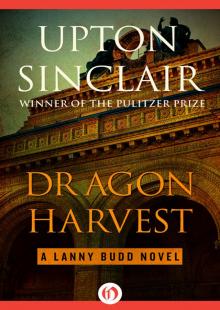 Dragon Harvest
Dragon Harvest The Jungle
The Jungle Sylvia's Marriage
Sylvia's Marriage Oil! A Novel by Upton Sinclair
Oil! A Novel by Upton Sinclair The Coal War: A Novel
The Coal War: A Novel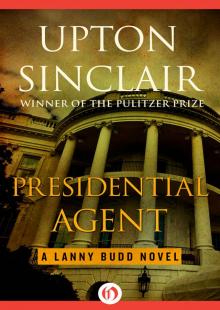 Presidential Agent
Presidential Agent World's End
World's End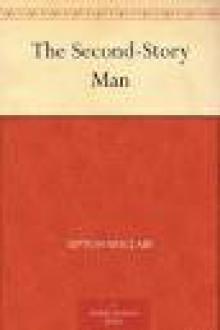 The Second-Story Man
The Second-Story Man O Shepherd, Speak!
O Shepherd, Speak!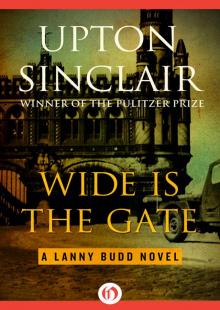 Wide Is the Gate
Wide Is the Gate The Return of Lanny Budd
The Return of Lanny Budd One Clear Call I
One Clear Call I 100%: the Story of a Patriot
100%: the Story of a Patriot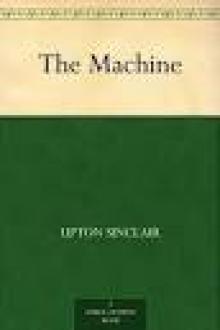 The Machine
The Machine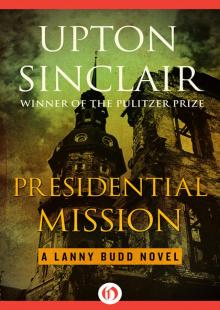 Presidential Mission
Presidential Mission A Cadet's Honor: Mark Mallory's Heroism
A Cadet's Honor: Mark Mallory's Heroism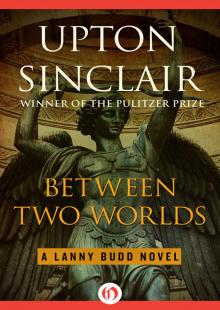 Between Two Worlds
Between Two Worlds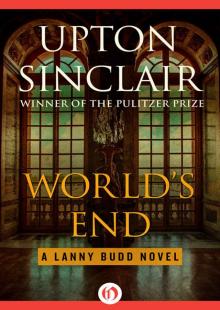 World's End (The Lanny Budd Novels)
World's End (The Lanny Budd Novels)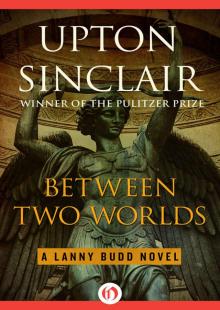 Between Two Worlds (The Lanny Budd Novels)
Between Two Worlds (The Lanny Budd Novels) The Coal War
The Coal War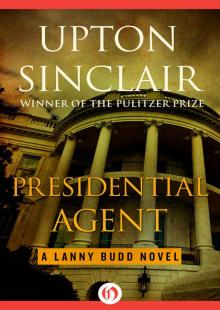 Presidential Agent (The Lanny Budd Novels)
Presidential Agent (The Lanny Budd Novels) Oil (filmed as There Will Be Blood)
Oil (filmed as There Will Be Blood)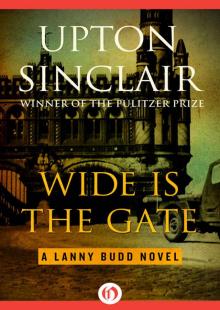 Wide Is the Gate (The Lanny Budd Novels)
Wide Is the Gate (The Lanny Budd Novels)